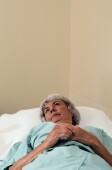Associated with polypharmacy, vision impairment, and urologic comorbidities
FRIDAY, Aug. 28, 2015 (HealthDay News) — Many elderly oncology patients use complementary and alternative medications (CAMs), including some that could interfere with their treatment, according to a study published online Aug. 12 in the Journal of Geriatric Oncology.
Ginah Nightingale, Pharm.D., an assistant professor at Thomas Jefferson University in Philadelphia, and colleagues conducted a secondary analysis of 248 patients (aged 61 to 98) who received an initial comprehensive geriatric oncology assessment between January 2011 and June 2013. The researchers collected data collected from electronic medical records, with CAM defined as herbal medications, minerals, or other dietary supplements, excluding vitamins.
The team found that 26.5 percent used CAMs at some point. Sixty-eight percent of those who used CAMs were 80 years of age or older. Associations with CAM use were polypharmacy (P = 0.045), vision impairment (P = 0.048), and urologic comorbidities (P = 0.021).
“Clear and transparent documentation of CAM use should be recorded in the patient’s medical record. This documentation should indicate that patient-specific communication and/or education was provided so that shared and informed decisions by the patient can be made regarding the continued use of these medications,” Nightingale said in a university news release.
Copyright © 2015 HealthDay. All rights reserved.








